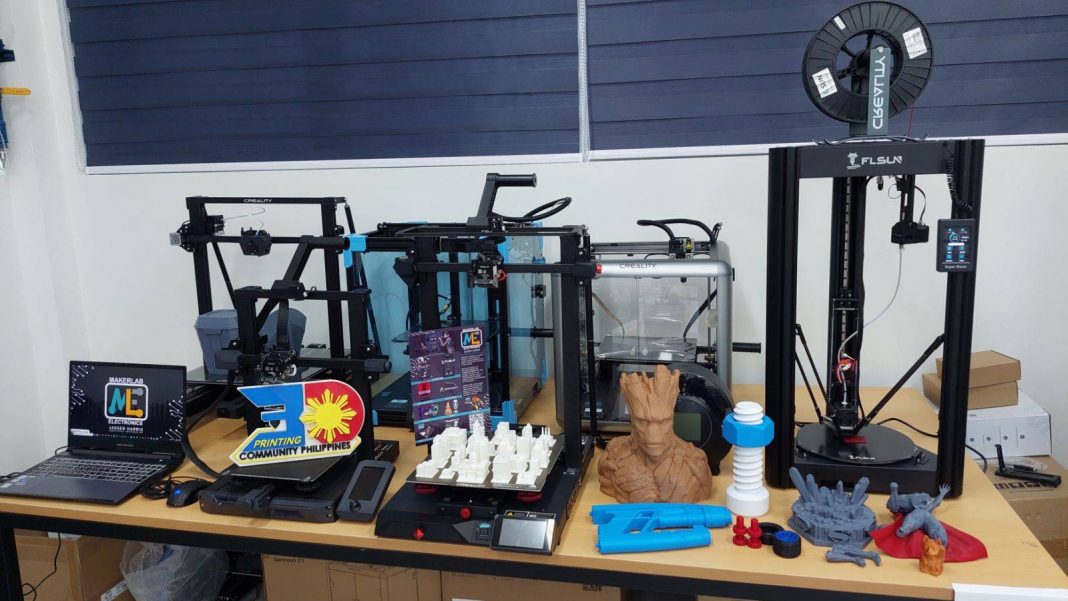Manila, Sept — Filipino ingenuity is known for its brilliance and innovative spirit including a trait called diskarte – a combination of skill, creativity and resourcefulness – which spans across many fields.
In the field of higher value-added product development, however, such as in electronics and mechanization, this creative potential has erstwhile been stifled by a lack of R&D support, and the scarcity of modern laboratory equipment.
It was this perennial challenge that gave rise to Makerlab, a startup some 7 years ago, that sought to make the materials and equipment needed by local innovators highly accessible to students and professional product developers. The materials and equipment had come to include, particularly those that are needed in spreading 3D printing technology.
Given its mission, Makerlab recently partnered with the Advanced Manufacturing Center (AMCen) of the Department of Science and Technology to promote research and development, tapping 3D printing, also known as Additive Manufacturing.
AMCen and Makerlab pushes for rapid prototyping, access to 3D printing technology
AMCen is DOST’s advanced manufacturing facility and state-of-the-art prototyping laboratory. It aims to level up the country’s competitiveness in manufacturing, serving as an innovation hub for advanced manufacturing, industrial design, and rapid prototyping
Rapid prototyping refers to the fast fabrication of a physical part, model or assembly using 3D computer aided design (CAD). The creation of the part, model or assembly is completed using additive manufacturing, or more commonly known as 3D printing.
“Because of the 3D Printing Community, I found out that AMCen is the premier base of prototyping in the country. We reached out to them and established a partnership that would allow more people to have easy access to affordable 3D printers,” Mike “Jassen” Sy, founder and CEO of Makerlab Electronics said.
Innovation
When people hear the words ‘Additive Manufacturing’ and ‘3D printers’, they quickly become intimidated because of its high cost.
“People have been going to AMCen to receive training on how to use high tech equipment, including the use of 3D printers. This is where Makerlab comes in, to provide our expertise and lend out some of our most cost-effective 3D printers. Not only are our 3D-printers affordable, they are also durable and deliver the same quality results as our more expensive competitors. We aim to show people and likewise encourage everyone, that they can start and afford to buy their own 3D printers, without breaking the bank,” said Sy.
Inspiration with 3D Printing
Makerlab, through its highly affordable 3D printers, empowers the youth to be able to use their creativity in literally printing amazing things. Filipino innovators can now create what they invent and envision.
To further support this endeavor, Makerlab Electronics recently participated in the 2022 Metals and Engineering Week. The participants explored the AMCen facility and what it offers. It opened their eyes by providing them access to valuable information on additive manufacturing and 3D printing.
“We want to eliminate the thinking that 3D printing is only for the rich. We have machines that can be bought for an incredibly low price. Our products are geared toward families and those who want to start their 3D printing business. We envision that many Philippine households in the near future would have 3D printers being used by their children for school and other projects,” said Sy.
Education is all about encouraging students to learn, not only through books, but more importantly, through experience and experimentation.
Dr. Mark Christian Manuel, a Science and Technology fellow at AMCen, a former dean for mechanical and manufacturing engineering, and an additive manufacturing enthusiast, proved that 3D printing is highly valuable in the school curriculum. He used 3D printers in his practice and highly emphasized that 3D printers are now affordable. Students can now practically print out what they have in mind using 3D printers and learn by trial and error until they become experts in 3D printing. In fact, through AMCen, Dr. Manuel wishes that this knowledge can likewise be used and applied in the K-12 program.
“The path to adoption in the Philippines, as many would know, is not straight. Filipinos are often faced with a lot of obstacles and challenges. Despite this, Filipinos still persevere and adapt. Given the right conditions and early exposure to technology, I believe we will be home to a great number of individuals who will shape the future of our industries. We at AMCen ensure that our students now have access to 3D printing with Makerlab as its strategic partner,” said Dr. Manuel.
As the country addresses the digital divide, the AMCen, and Makerlab partnership will lead the way in promoting additive manufacturing and 3D printing and finally provide more access to this previously unaffordable technology, for both homes and businesses.
“We want to be the top-of-mind choice of Filipinos when they think about 3D printers, whether for personal or business use. Our goal is to make 3D printers as affordable and as accessible as possible for every Filipino,” Makerlab’s Sy said.
For any query with respect to this article or any other content requirement, please contact Editor at [email protected] Bulletin
Read More Stories:

